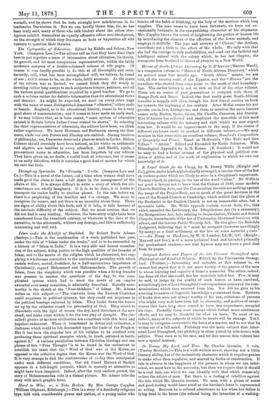The Cyclopcedia of Education. Edited by Kiddie and Schem, New
York. (Sampson Low.)—The editors tell us that they have done their beat to put together a mass of information about education, its theory, its growth, and its most conspicuous representatives, within the fairly moderate compass of a double-columned volume of 900 pages. Of course it was hardly possible to do this at all thoroughly and satis- factorily, still, what has been accomplished will, we believe, be found of use ; and it seems to be, on the whole, fairly accurate. As the space of the editors was so limited, we cannot think they did wisely in devoting rather long essays to such subjects as temper, patience, and all the various moral qualifications required by a good teacher. We go to such a volume rather for definite information than for educational views and theories. As might be expected, we meet on every other page with the name of some distinguished American "educator," either male or female. England, as to its educational history, comes in for a very good share of commendation ; and it seems to have made an early start, if we may believe that, as is here stated, "some system of education existed in Britain before Julius Ctesar visited its shores." In selecting the chief representatives of education, the editors have been, we think rather capricious. We have Hertnann and Buttmann among the Ger- mans, while our own Porson and Elnasley are omitted. Among teachers of philosophy, too, Descartes deserved a place as much as Locke. Bishop Colons° should certainly have been noticed, as his works on arithmetic and algebra are familiar to every schoolboy. And Euclid, again, a pre-eminent name in education, has been forgotten by our editors. They have given us, no doubt, a useful book of reference, but it seems to us sadly defective, while it contains a good deal of matter for which we care but little.






































 Previous page
Previous page